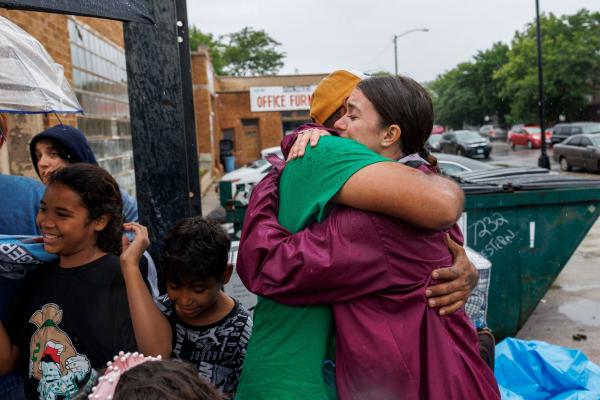In 1985, Chicago Mayor Harold Washington passed an ordinance prohibiting city workers from cooperating with immigration police to detain and deport undocumented migrants. With this ordinance, Chicago became a sanctuary city, joining other U.S. cities in resisting policies that criminalize migration. Almost 40 years later, Republican Gov. Greg Abbott has used Chicago’s sanctuary status as an excuse to bus and fly thousands of migrants to the city from Texas, where he has instituted strict migration policies.
Since Texas began bussing and flying migrants to Chicago in 2022, the city has welcomed over 30,000 migrants. These migrants have endured terribly cold winters, undignified housing, and a city divided by feelings of frustration, indifference, and solidarity.
News outlets have documented the living conditions of new migrants in Chicago. Migrants are crowding aboard CTA buses; migrants are sleeping in overcrowded shelters; migrants are living on the streets or in tents. Chicago, it seems, represents immigration policy and altruistic ideals gone wrong. Local governments are burdened by nationwide immigration policies. Is this what it means to be a sanctuary city?
Social pressures have led some residents to call for the end of Chicago’s sanctuary city status. They’ve built rhetorical momentumby imagining a “we” that makes up the city’s residents and excludes Chicago’s newly arriving migrants. The presumption, for some Chicago residents, is that we are not responsible for Abbott sending people to Chicago and that we are going to suffer due to Chicago’s status as a sanctuary city. This is a rhetoric that allows us to neglect responsibility to our new neighbors.
Amid the pressures to end Chicago’s sanctuary city status, Chicago Mayor Brandon Johnson has consistently been advocating for policies that will lead to better living conditions for migrants. In April, the city council approved Johnson’s request that $70 million be taken from a surplus fund to be used on behalf of Chicago’s migrants. This comes just weeks after Johnson called for the federal government to grant work permits to immigrants regardless of their migration status.
“The migrants coming to Chicago aren’t the crisis. Our inability to welcome them is,” said Rev. Paula Cripps-Vallejo, pastor of Humboldt Park United Methodist Church, a Latinx congregation that has always felt the urgency of welcoming new migrants. When I talked to her over the phone, she told me that the problem of migration is not new and that Chicago has always been a city that experiences migration on a regular basis. “What has shifted is how folks are being sent to Chicago — some are choosing to go and some are not — as pawns in a political game.”
In response, her church has been doing what it has always been doing: helping newly arrived migrants feel at home after long, uncertain, and costly journeys. In response to the recent wave of migration, they’ve provided housing for three families and raised funds to help pay for public transportation cards for migrants; they’ve partnered with local mutual aid group El Árbol to start a free store for essential items like blankets and clothes.
I asked her why the church felt compelled to help. “The majority of Latinx congregations are doing this because this is what it means to welcome Jesus as Jesus welcomed us. We were strangers. It is the biblical story lived out in real-time.”
Humboldt Park United Methodist Church is not alone in its efforts. David Tolen, a construction worker who immigrated to Chicago from Mexico in 1998, began organizing friends and family to aid migrants at the end of 2022. He realized the extent of the situation when he was working in West Ridge on the North Side of the city. A recent migrant who needed work walked onto the site and asked him for a job. He said yes. After a day of work, the young man, who Tolen learned was 17 years old, did not return.
Tolen went to the address the man had listed as his “home” to make sure he was okay. What he found shocked him. The address listed a YMCA that was being used as a shelter to house many migrants. “People started asking me for work and this or that,” said Tolen. “And that changed my plans for the future.” Since then, Tolen has organized a GoFundMe to help provide mutual aid for women to find and rent their own housing. Now, his tactics are informal and concentrated. Working with one family at a time, he helps them to get out of the shelter by connecting with landlords who are willing to work with Catholic nonprofits.
I asked Tolen about Chicago’s response to the recent increase in migration: “It is not easy to house 15,000 people at once,” he said before mentioning his own experience coming from Mexico. “As a Mexican, we never get any help from the U.S. government or from any city. We just came and tried to do everything ourselves.” But Tolen sees something different happening now in Chicago when it comes to migrants — which has given him hope.
Still, helping people find housing has been particularly challenging. The shelters are overcrowded, have set stay limits, offer little food, and have been centers of illness and outbreaks. Ultimately, these shelters provide bare minimum living conditions.
Luisette Kraal, a nurse practitioner and church planter who helped start a basic goods store for migrants, expressed frustration at local and national governments. Kraal told me over the phone that she is hoping for a more humanizing response from both federal and local governments. “The people who pick up the tabs are us — the churches. Had it not been for us, how would people have made it through the winter? There are no clothes, goods, jobs, nothing. There are shelters, but nothing else.”
In response to Illinois’ failure to provide dignifying shelter, Kraal’s church started a community living space called Casa Monarca, located in Chicago’s Uptown neighborhood. Kraal told me that Casa Monarca currently hosts 38 migrants in individual, studio-like apartments. Kraal, like Cripps-Vallejo, emphasized the significance of agency and dignity. In contrast to the shelters, where migrants share a single auditorium-sized room with 100 to 200 other people, Monarca residents have a private space with a shared kitchen and bathrooms. Of course, these kinds of centers are not without costs, and Kraal mentioned the need for additional funding and building space for more long-term and sustainable residential community centers.
Churches like Humboldt Park UMC and advocates like Tolen and Kraal raise the question of just what is required for Chicago to truly welcome migrants. Their work asks the best of the city and demands of all of us who call the city home the responsibility to materialize the ideals that Christians proclaim yet so often struggle to embody: welcome, hospitality, and recognition of the humanity of the migrants who have become our neighbors.
Got something to say about what you're reading? We value your feedback!







